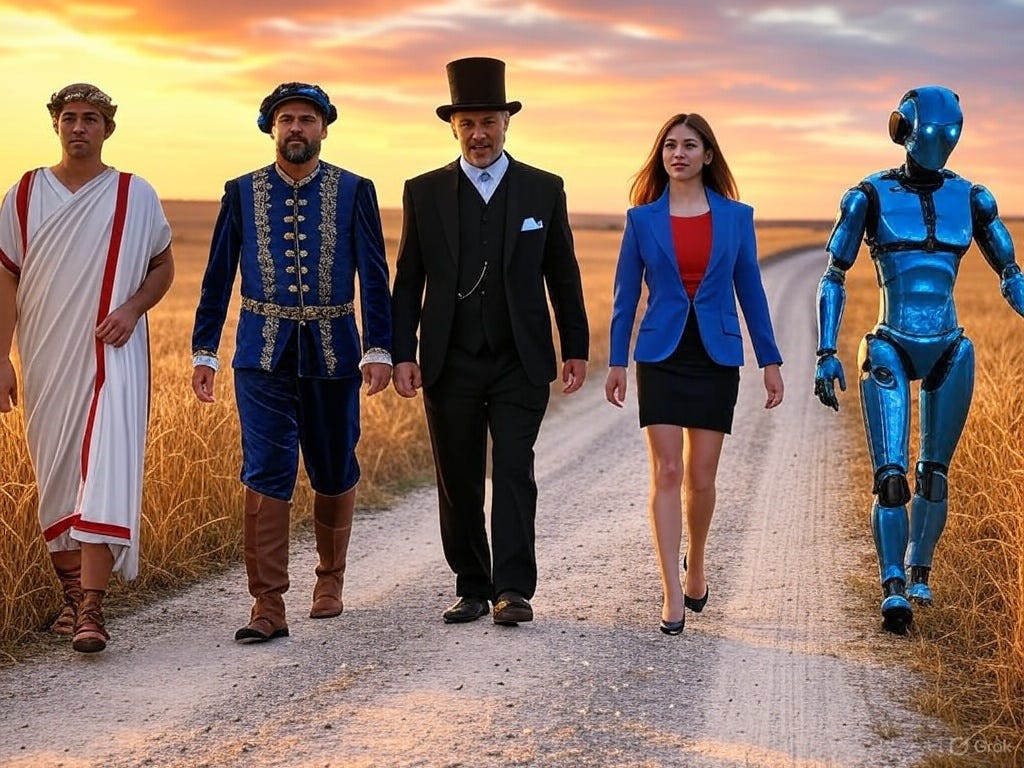TecC 08 - The Road to Knowledge Forever - The Plan
Key points and concrete details on what to expect on our journey exploring innovation, progress and achievement
The last 4 episodes have had the intention of setting the stage for what I am talking about in this series. Let’s take stock, let’s briefly recap what I’ve said so I can now present my plan for what’s to come next on here over the next few months.
This journey is fundamentally about taking a new way of looking at the world, the technocentric paradigm, wherein I use the term technology as encompassing all of human activity, everything where man modifies nature to build a new artefact - the tools that augment our own human capabilities as determined by our biology. But in the technocentric view, I’m also including, in a deliberate divergence from established norm, abstract elements that have been instrumental in enabling us to build these physical instruments, themselves as part of ‘technology’.1
Thus we have both artefactual and institutional technologies that together allow us to take this integrated technocentric view. I trust I’ve made my case about this when I talk about it in depth in particular in 02 - A First Look - A New Framework.
Next up, in TecC 03 - A Stepping Stone, I’m briefly chronicling the very birth of technology, within the scope of my definition stated above, followed by whistle-stop tour of some key breakthroughs in TecC 04 - From Stone to Silicon, coming right up to more or less the present day, with some more basic details and examples in the remaining 3 articles before this.
So, next begins the real part of the journey! In so far as this is a historical outline of human progress, I have found it convenient to divide this into 5 stages or sections:
Pre-Modern [PM]
Renaissance & Enlightenment [RE]
Industrial Revolution [IR]
Information Age [IA]
AI Age [AI]
Having decided on this, the next big question is that of sequence: in what order to go about this. Obviously, the more recent developments might be of more interest, not to mention immediate relevance, to you, or in general, to most people. And me being someone who has made an earnest attempt to dig into both history and peer into the future - that seemingly odd juxtaposition you’ve seen on my profile summary “History & Futurism”, I am indeed very keen on presenting my view of how the near future might be likely, probably, maybe, to turn out!
But here is a key epistemological principle I strongly subscribe to:
We cannot speculate about the future if we don’t understand the present.
We cannot understand the present if we don’t know about the past.
And we cannot understand any topic well enough if we don’t also look at related topics surrounding it.
So that’s my proposed trichotomy about time and space - it’s a diachronic and peritopic2 epistemology.
And that forms the very basis, inspiration and motivation of this exploration, this view, this technocentric approach to making sense of things.
So, what’s it then practically eh? I propose to start by a chronological approach here. Having thrown out a teaser or two - an extremissimally brief account of the Industrial Revolution - both the institutional technological developments in Great Britain in the run-up to it and then more or less a list of the artefactual technologies as part of it, for example.
But now I shall reset the clock to ‘zero’ again on the technocentric timeline and we shall get going from there. You will be right to expect a lower level detail in the earlier phases of this journey undertaken chronologically, both for the reasons of interest/relevance mentioned, but also because of the relative paucity of information of the more remote past.
Furthermore, given the exponential nature of technological progress, you may argue that developments going back to the mists of time are not as important as the later ones - I shall suggest we offline that discussion to the comment section of this article.
As a middle ground, my focus hereafter is going to be a bit more on outlining what happened, with in many cases less detail about some of the specifics than I might like to cover, but with the door left open for a more thorough treatment should you and other readers want it - so do not hesitate to comment on such stuff under each article.
Now despite this chronological approach I intend to take, I’m not closed to the idea of, at least in due course, changing tack to something based on other factors rather than just order of events on the timeline: perhaps the more important or the more interesting or the more intriguing ones get more prominence? Again, I’d ask you to tell me what you’d prefer - I’d invite you to comment on this and related matters under each article in this series.
Because, that feedback is important, and I am genuinely interested in knowing what you think of my ideas as expressed in these writings. Because without this becoming a more interactive forum where you can share your ideas and reactions to mine, this wouldn’t be as interesting a journey as you can help make it.
So thank you for making it on this journey with me so far, and here’s to some fun technocentric exploration ahead! 🥂
There will be other paradigms I’ll be introducing in addition to the technocentric view, so keep an eye out on for them on my other stream dedicated to such broader epistemological exploration - Polymathon
Conveniently enough for my case (and thank you Aristotle!), the word ‘topic’ comes from Greek ‘topos’ “a place”!




